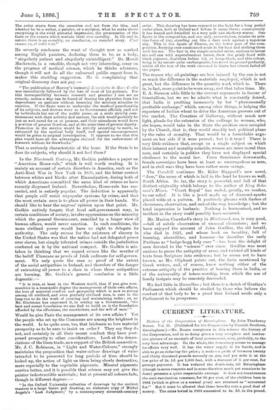CURRENT LITERATURE.
History of the Corporation of Hirrninyliain. By John Thackeray Bunce. Vol. II. (Published for the Corporation by Cornish Brothers, Birmingbam.)—Mr. Bunce completes iu this volume the history of the Corporation, and in so doing gives a very complete and instruc- tive picture of an example of local government, seen, probably, to the very best advantage. On the whole, the democracy seems to manage its affairs very well. It has the water supply in its hands, and is able to go on reducing the price ; it makes a profit of between twenty and thirty thousand pounds annually on gas, and yet sells it at the low price of 2s. id. per 1,000 feet, with a discount of 5 per cent. for prompt payment. It has reduced the death-rate, till Birmingham (though in some respects and in some districts much yet remains to be done) presents a quite respectable average. It does not countenance the anti-vaccination nonsense, for 96 per cent. of the children born in 1882 (which is given as a normal year) are returned as "accounted for." But it must be allowed that these benefits cost a good deal of money. The rates levied in 1884 amounted to 4s. 5d. in the pound.
As gas, markets, &c., bring in some money, the total borough expenditure is nearly half-a-million. Part of this, however, goes to the repayment of loans; and the Gasworks, which were paid for by annuities, are at present a source of expense, though, of course, the balance will before long be on the right side. The loans amount to £1,629,329. The capital invested in the Gasworks, Waterworks, and Improvement Scheme is £5,615,266. There is much, doubt- less, to be learnt from this volume. Here, for instance, are some interesting statistics, which all local authorities might ad- vantageously ponder. In street-paving there seems to be no absolute standard of expense. It depends upon the traffic of a street how it may be most cheaply paved. In a very busy thoroughfare, macadam costs annually 4s. 30., wood 2s. 31d., and granite ls. 91d. In one where the traffic is small, the proportions are very different; wood costs 2s. lid., granite ls. 70., and macadam 71d. In one matter, that of education, the Council seems to have behaved with conspicuous unwisdom, and it is exactly the matter in which popular election is not to be trusted. The average voter and his average representative do not appreciate or understand educa- tion. Indeed, the fact that they do not is the justification for educational endowments and for State aid. The Council obstinately insisted on electing the whole of the Governors of King Edward's School; they fiercely resented the appointment of representatives by the Universities of Oxford, Cambridge, and London, "public bodies not connected with the town," as they contemptuously call them. It is satisfactory to find that this opposition has been unsuccessful.



































 Previous page
Previous page